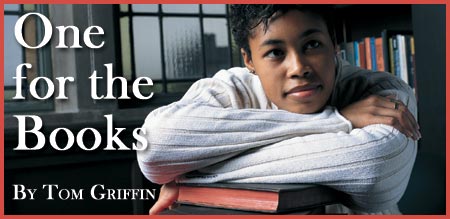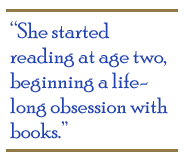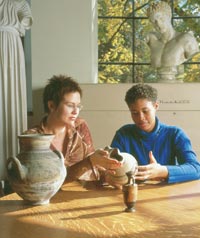March 2004 -

What comes across most strongly (and what the Rhodes committees undoubtedly detected) is her tremendous love of learning. She started reading at age 2, beginning a lifelong obsession with books.
"You couldn't keep me away from books," she recalls. "I took a book with me everywhere. In second grade a teacher's aide told me, 'You read too much.' I lived in the Bothell Library. I grew up in that place."
Second grade was also when she fell in love with ancient history. "My grandfather was always sending me books. He sent me this book on Egypt called Land of the Pharaohs," she says. Meant for students at the junior high and high school reading levels, Lamb read the book twice and found the topic fascinating. "Something sort of clicked," she recalls.
In middle school, while most girls experimented with the latest fashions and makeup, she had a make-your-own hieroglyphics kit. In high school, she says she was one of the "geeks" who quietly sat in the back of the class. At times she knew more about a historical subject than her teacher.
 At the UW she came into her own. She took ancient Greek and Biblical Hebrew. The classics department awarded her two James Greenfield Scholarships. The Greenfield Endowment also helped finance travel expenses for the spring quarter in Rome program. Professor Sarah Culpepper Stroup invited her along to an archaeological site in Israel, digging among the Bronze Age ruins at Tel Dor.
At the UW she came into her own. She took ancient Greek and Biblical Hebrew. The classics department awarded her two James Greenfield Scholarships. The Greenfield Endowment also helped finance travel expenses for the spring quarter in Rome program. Professor Sarah Culpepper Stroup invited her along to an archaeological site in Israel, digging among the Bronze Age ruins at Tel Dor.
Asked about her mentors, she rattles off a long list of faculty and staff who made an impact: Paul Scotton, Catherine Connors, Larry Bliquez and Ruby Blondell in classics, Scott Noegel in Near Eastern languages and literature, Mona Pitre-Collins and Nichole Fazio in the Office of Undergraduate Education.
But when some of them suggested that she try for a Rhodes Scholarship, Lamb was skeptical. "I really didn't expect to be nominated by the school," she says. "I didn't fit into the mold."
In the will that started the scholarships 101 years ago, Cecil Rhodes stipulated that candidates must meet high academic and intellectual standards. He also required that candidates display integrity of character, interest in and respect for their fellow beings, the ability to lead and the energy to use their talents to the fullest.
The last qualification traditionally has been interpreted as a sports requirement, which is why Lamb didn't think she fit the usual Rhodes standards. "I jog, but I'm not a part of any organized sports team," she says.

Classics Professor Sarah Culpepper Stroup (left) and Allyssa Lamb discuss archaeological artifacts similar to those found at a dig at Tel Dor, Israel. Stroup asked Lamb to join her and other students excavating the Bronze Age ruins. Photo by Kathy Sauber.
The scholarship committees have loosely interpreted Rhodes' stipulation on athletics and Lamb's UW advisers told her she would still qualify. So she began the arduous application process that includes a personal statement, nomination by her university and two stages of screening interviews.
"The personal statement was tough. It is totally open-ended," she explains. A traditional personal history would not stand out, so she decided to tell a story. She described her visit to the national museum in Naples, Italy, which has an extensive collection of ancient Roman artifacts. "Here was this fabulous Roman art, and all I could think about was the Egyptian collection. It was hidden away and not terribly obvious, but I found it," she says. "It was an epiphany for me."
Lamb was one of four UW students nominated for the state interviews. The screening committee is usually a mix of former Rhodes Scholars and civic leaders. They pepper each candidate with 30-45 minutes of questions and can call them back for more at the end of the daylong process.
In his biography of Bill Clinton, First in His Class, author David Maraniss describes the Rhodes interview process as "among the most peculiar enterprises in academia, equal parts dissertation defense, locker-room sizing up, television quiz show, cocktail party bull session, debating society and drawing of straws."
Go To: Page 1 | Page 2 | Page 3
Rarified Air: UW Rhodes Scholars Since 1960: Page 1 | Page 2
Home / Current
Issue / Archives / Talk
Back / Advertising / Columns FAQ / Alumni Website / Search
 At the UW she came into her own. She took ancient Greek and Biblical Hebrew. The classics department awarded her two James Greenfield Scholarships. The Greenfield Endowment also helped finance travel expenses for the spring quarter in Rome program. Professor Sarah Culpepper Stroup invited her along to an archaeological site in Israel, digging among the Bronze Age ruins at Tel Dor.
At the UW she came into her own. She took ancient Greek and Biblical Hebrew. The classics department awarded her two James Greenfield Scholarships. The Greenfield Endowment also helped finance travel expenses for the spring quarter in Rome program. Professor Sarah Culpepper Stroup invited her along to an archaeological site in Israel, digging among the Bronze Age ruins at Tel Dor.
